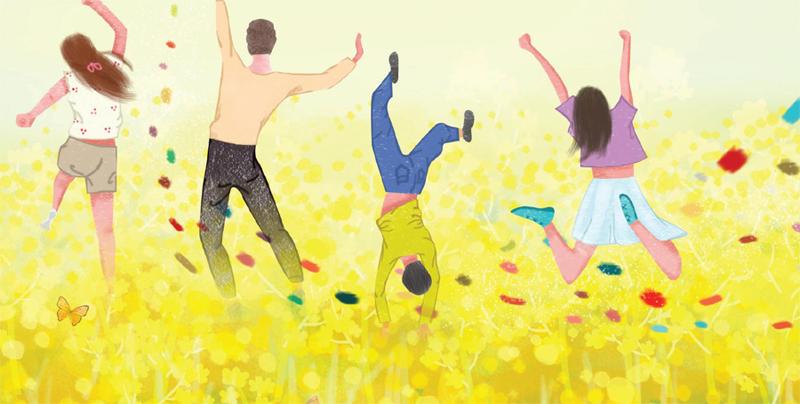闹:一派繁华,一份喧嚣

The world is noisy. Since we can no longer escape to the mountains, the only solution is to find peace within the hubbub,” concluded the contemporary Chinese writer Wang Zengqi in his essay “Sitting in Quiet Leisure Here.”
Certainly, throughout Chinese history, people have tried different ways of finding peace in this bustling world. Late Ming poet Feng Menglong proposed that “one achieves real leisure only by seeking peace and quiet from noisy surroundings,” while Mao Zedong, as a university student, was said to have intentionally studied in the busy streets of Changsha in order to better his ability to focus.
According to the 2,000-year-old dictionary Explaining and Analyzing Characters, 闹 (n3o, noise, commotion) is the opposite of 静 (j#ng, quiet). First appearing over two millennia ago, the seal script of the character comprises an outer radical of 鬥 (d7u, tussle), which resembles two people fighting, and a “market” radical, 市 (sh#), inside, indicating a bustling or noisy environment. The simplified form of the character replace 鬥 with 門 (m9n, door) for easier writing.
The characters basic meaning has remained throughout history, and has spawned many terms to describe different types of noisy behavior: 嬉闹 (x~n3o, laughing and joking), 哄闹 (h4ngn3o, making a scene), and 闹哄哄 (n3oh4ngh4ng, an onomatopoeia for noisy or clamorous surroundings). The character can also be used by itself as an adjective, as in 这里闹得很,没办法看书。(Zh-l@ n3o de h0n, m9i b3nf2 k3nsh$. Its too noisy to read here.)
Of course, some distractions are welcome. For a rowdy atmosphere that makes one want to join in rather than tune out, 热闹 (r-n3o, lively, festive) is the adjective to use, as in 热闹的酒吧 (r-nao de ji^b`, a rowdy bar). As a verb, 热闹 can mean “to enjoy oneself,” especially on festive occasions. For example, 今天过节,大家热闹下吧! (J~nti`n gu7ji9, d3ji` r-nao xia ba! Its a holiday, lets live it up!) Businesses also prefer a busy street (闹市, n3osh#) over a quiet one.
However, 看热闹 (k3n r-nao, rubberneck), or being a bystander to an incident or activity, has more negative connotations. As a Chinese saying goes, 内行看门道,外行看热闹。(N-ih1ng k3n m9nd3o, w3ih1ng k3n r-nao. Insiders know the ropes, while outsiders watch the show.) The phrase 看热闹 implies a superficial interest in an incident, with neither understanding nor empathy for the people involved. Today, the phrase is often found in news reports excoriating “bystander effect,” but as Lu Xuns 1933 essay “Experience” observed, this has long been the case: “In China, especially in the cities, if someone falls ill and collapses on the road, or meets with a traffic accident, many passersby will stand around to watch and even enjoy themselves, but few will offer a helping hand.”
As a verb, 鬧 can refer to quarreling or rioting, such as争闹 (zh8ngn3o) or 吵闹 (ch2on3o), both meaning “to squabble,” and 大吵大闹 (d3ch2o d3n3o, kick up a big fuss). 闹意见 (n3o y#ji3n) is to bicker over a difference of opinion. People who deliberately stir up trouble, or 无理取闹 (w^l@ q^n3o, make a fuss over nothing), are not usually well-regarded, though one famous exception is the fabled Monkey King: In “孙悟空大闹天宫 (The Monkey Kings Uproar in the Heavenly Palace,)” one of the best-known chapters in Journey to the West, the simian protagonists destruction of the Jade Emperors realm is sometimes interpreted as a heroic revolt against an oppressive regime.
Due to its negative connotations, the verb 闹 often refers to illness, disaster, and other unpleasant happenings. For example, 闹肚子 (n3o d&zi, suffering from diarrhea), 闹饥荒 (n3o j~huang, experiencing famine), and 闹笑话 (n3o xi3ohua, making a humiliating mistake). 闹脾气 (n3o p!qi) describes throwing a tantrum, while 闹情绪 (n3o q!ngx&) means “to be in a bad mood.”
On the other hand, the festive connotations of the character come into play in闹元宵 (n3o yu1nxi`o, celebrating the Lantern Festival), the term for festivities on the 15th day of the first lunar month. Similarly, 闹洞房 (n3o d7ngf1ng, rioting the wedding chamber) refers to the pre-nuptial pranks that wedding guests customarily play on the couple. Though some of these can overstep into harassment of the newlyweds, traditionalists believe that its acceptable to 闹着玩儿 (n3ozhew1nr, joke around), as long as things dont get out of hand.
The unruly and earthy connotations of 闹 also made it a standby for Communist slogans: Propaganda posters in the 1950s included calls to 闹革命 (n3o g9m#ng, engage in revolution) and 闹生产 (n3o sh8ngch2n, engage in production). A more neutral use of the verb means to probe deeply into an issue, such as 把问题闹清楚 (b2 w-nt! n3o q~ngchu, ferret out the truth about the problem). 闹 doesnt have to involve people, though: Northern Song poet Song Qi imaginatively describes a spring scene as “绿杨烟外晓寒轻,红杏枝头春意” (Green willows loom like smoke in distance on a cool morning; apricot blossoms in full riot indicate the awakening spring).
In sum, a little noise or bustle isnt all bad. Between the choice of struggling for calm and giving in to utter pandemonium, a happy medium might be to see life as wuxia author Louis Cha did: “大闹一场,悄然离去。 (D3 n3o y# ch2ng, qi`or1n l!q&. Make an uproar and leave quietly.)” Life is a 闹剧 (n3oj&, farce) anyway—so make the most of it.

